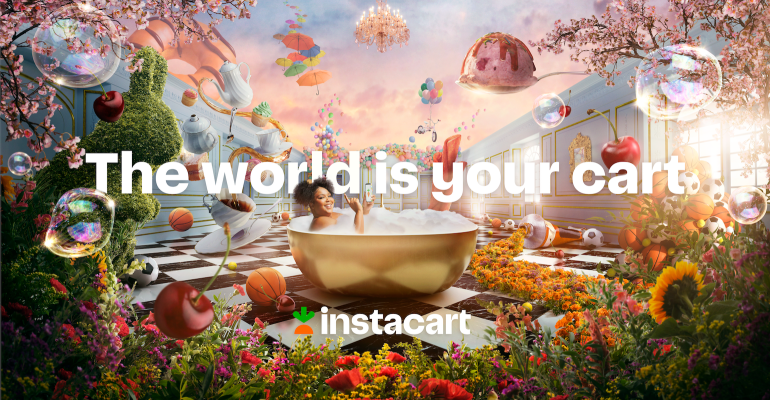As it gears up for an anticipated IPO, Instacart continues to invest in Gen Z-attractive features, with the launch of its new in-app shopping experience that leans into celebrity influencers.
Branded “The World is Your Cart,” the San-Francisco-based company is calling the shopping feature itself Carts, which encourages shopping centered around events (“Self Care Sunday,” “Game Day”) or via existing carts curated by celebrities. Users are then able to add the products to their own carts.
The feature rolls out with the cart of musician and singer Lizzo — who is at the center of Instacart’s multi-faceted marketing campaign touting the new shopping option. The campaign even kicked off during August’s VMA music awards ceremony (where Instacart was an official sponsor), with Instacart debuting a commercial starring Lizzo following an onstage performance by the singer.
The move comes as the company gears up for a much-anticipated IPO — Earlier this summer, Instacart rolled out a brand refresh, and in March the company launched another Gen Z-friendly shopping option, with shoppable recipes and a TikTok integration, which allows TikTok users to add grocery items used in the video to their shopping cart via one click.
So what can the grocery industry learn from Instacart’s latest moves? We spoke with Celia Van Wickel, senior director of digital commerce for data analytics and brand consulting company Kantar, about some key takeaways.
- Speaking the language of Gen Z. “Using Lizzo and using the VMAs to drop this commercial indicates that Instacart is very committed to growing brand loyalty among Gen Z,” Van Wickel says. “Part of what they’re doing, it’s also just part of growing their presence for their brand through influencer strategy.” And there’s room for growth. As of Friday, Instacart had 22.5K followers on TikTok, as compared to Lizzo’s 25.2M followers.
- Expanding its categories. In the official Carts commercial, Lizzo orders Takkis, but she also orders less traditional grocery items like a phone charger and flowers. That focus feels in line with another recent move: Instacart’s large item delivery program, which encourages users to keep the app top of mind for bigger items like outdoor furniture, home office supplies and electronics. “They’re trying to think about the whole portfolio play, not just what you can get at a grocery store,” Van Wickel says.
- Smart homepage thematics. The Carts feature exists as a scrolling banner at the top of the app’s homepage. The move is a smart one, Van Wickel says, as it allows for multiple funnels into the shopping experience. Similarly, when Instacart rebranded earlier this summer, they added categories like “Ready Meals,” “Electronics,” and “Sports Gear” at the top of the app — a parallel to the layout of Gen Z-favored DoorDash. “Both [companies] are trying to capture more channels beyond the core of their business,” says Van Wickel.
- Doing influencer partnerships right. While Instacart has been heavily promoting its Lizzo partnership and commercial, the agreement does not appear to have extended the other direction, as both Lizzo’s Tiktok and Instagram pages lack a reference to the campaign. “They need to integrate it better,” Van Wickel says of Instacart’s campaign. “They have it on their website, they have the commercial. They did make a big splash with the VMAs, but they need to do more to integrate their strategy as a whole.”
- Influencers. A space grocery can (and should) play in. Supermarkets are already moving into this space. Last year, Walmart announced that it was “doubling down” on its embrace of TikTok. “Products that are not as well known can go viral on Tiktok. They’re random, they’re niche,” Van Wickel says. “My daughter is always asking me to buy things she sees on Tiktok.” Van Wickel stresses this is a total opportunity for grocery. Medium-sized brands, especially, could consider adding budget towards influencer partnerships on Tiktok product placements.
What do you think of this move by Instacart? And should traditional grocery be investing in influencer partnerships? Comment below and tell us.





